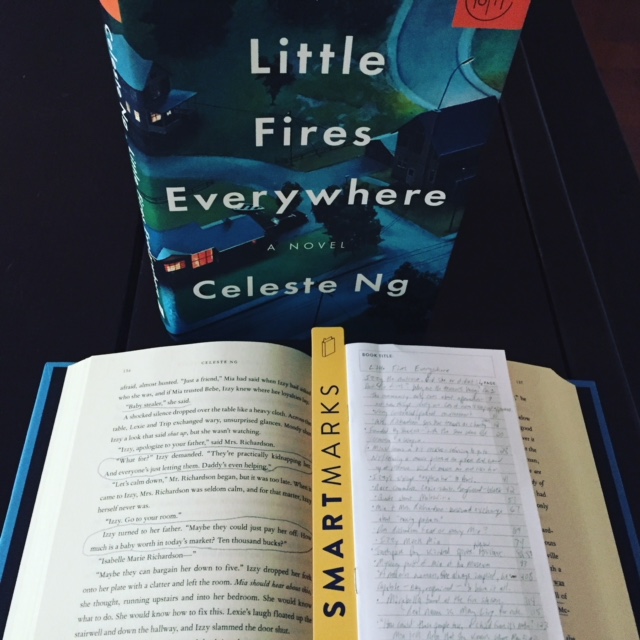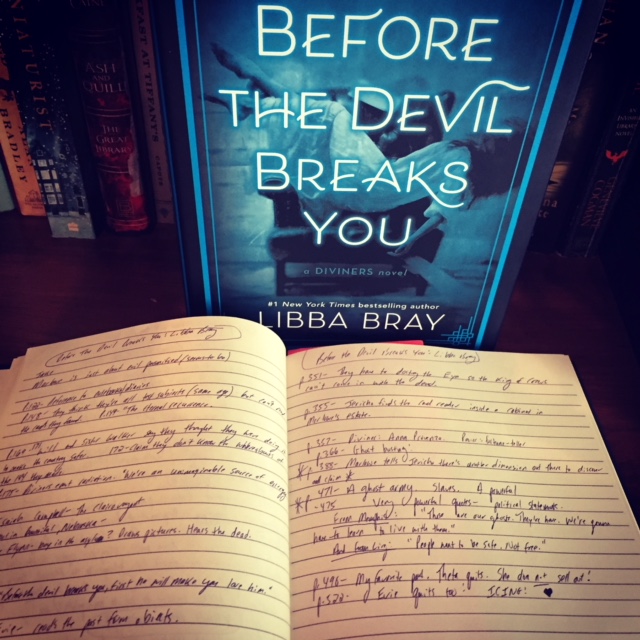Notes from Smartmarks by BestSelf Co, while traveling without my reading journal. These bookmarks with notes were the perfect travel solution for me! At home, I keep a reading journal for my notes, but I was able to tear my notes out when I got home and filed them within my reading journal. The Smartmarks were very convenient!
This selection was an extra purchase I made through Book of the Month Club after hearing so much buzz about the book. I found “Little Fires Everywhere” to be an absorbing book, guaranteed to make you think and spark debate among book club members everywhere.
At first, I thought the book was going to be focused more on Izzy and her alleged “craziness,” as her siblings refer to her issues, but it was more of a character study of Izzy’s entire family (the Richardsons) and their new tenants, artist mother Mia and her daughter, Pearl. By the way, Izzy is not “crazy,” she just doesn’t fit into the cookie-cutter mold her family wishes to mold her into.
While there were plenty of witty and even positive exchanges in the story, make no mistake about it, this is no fairy tale happy ending of a story. Ideas to spark discussion come from such themes as: teenage pregnancy; adoption; what lies beneath the “perfect” neighborhood; what makes someone a mother; and what is heartbreak. What are the things that we carry with us?
What are the sacrifices we make in the pursuit of a better life? Were they worth it?
The story takes place in Shaker Heights, a planned community that has lots of rules, and is the embodiment of a neighborhood that is really only concerned with the surface being perfect, and damn what lies beneath!
In my opinion, the most evil character is do-gooder suburban mother Mrs. Richardson. She ruins lives by her interference. She never does a good deed without calculating it for a return favor later, and if she does something she deems “good” for another person, she expects the recipient to kowtow to her. And oh, how judgmental she is. Mrs. Richardson actually may take the nomination for most-hated literary character this year.
Mia, the artistic mother, is highly gifted, but will not “sell out” when it comes to her art. Thus, she provides a poverty-stricken, nomadic lifestyle for her daughter, Pearl. Yet, she somehow always manages to supplement her artist’s income with menial jobs, and while they are not rich in material goods, they don’t seem to go without the necessities. This is a huge debate for readers to discuss. What is the parental obligation to provide for a child? If you have the ability to generate a lot of income, what is your obligation to make money if you are able? To what extent does security and stability come in to play over adventure and art when raising a child on your own? We know that Mia had the talent and the connections in Manhattan to make a great deal of money as an artist, but she did not want to sell out. (Arguably, she may have been worried about becoming too high-profile because then she may have caught the attention of the Ryans, which if you have read the book, you know she had to stay hidden).
Another big issue for debate is what readers think of Bebe giving up May Ling and then the custody battle between her and the adoptive parents, Linda and Mark McCullough. Do you think the judge’s ruling was fair? What do you think about Bebe’s actions in the end of the book? Are there circumstances so severe that people no longer deserve a second chance?
The way Ng interweaves the story of Mia and Bebe is masterful. I was engaged, and wanted to keep reading to find out Mia’s secrets.
Other relationships and questions to discuss: the relationship between Mia and her parents; what you think of the relationship between Mia and the Ryans; does Lexie regret her big decision; and who does Pearl’s heart break for – the loss of the relationship with Trip or with Moody? What do you think happens to Izzy in the end?
Quotes I Collected for my Reading Journal:
· Page 245: “You’ll always be sad about this, Mia said softly. But it doesn’t mean you made the wrong choice. It’s just something that you have to carry.”
· Page 250: “The question is whether things are still the same. Whether she should get another chance… Most of the time, everyone deserves more than one chance. We all do things we regret now and then. You just have to carry them with you.”
· Page 295: “Sometimes, just when you think everything’s gone, you find a way… Like a prairie fire. I saw one, years ago, when we were in Nebraska. It seems like the end of the world. The earth is all scorched and black, and everything green is gone. But after the burning the soil is richer, and new things can grow… People are like that, too, you know. They start over. They find a way.”







